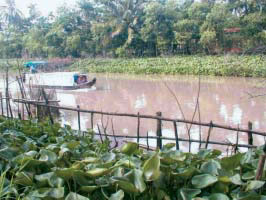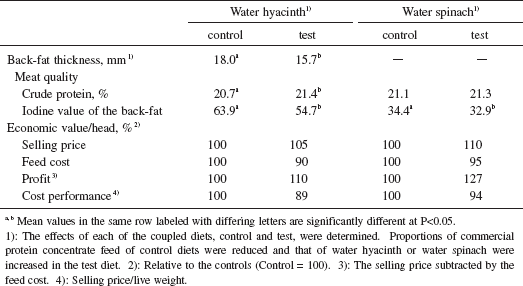Improvement of feeding management and meat quality of pigs by using locally-available under-utilized feed resources in the Mekong Delta region of Vietnam
Description
[Objectives]
In the Mekong Delta region of Vietnam, many forms of rice-based farming systems have taken root, and swine production has become an important component of these farming systems. Most swine production is carried out by small-scale farmers who depend on pork as an important means of income-generating activity. However, a nutritional imbalance in the pigs' diet has become apparent, due to the high percentage of rice bran used in their feed. To compensate for this imbalance, farmers also use commercial protein-concentrate feed (concentrate feed for short), but the additional costs of concentrate feed often become a financial burden for the producer. In addition, the meat quality of swine produced at small-scale farms tends to be lower, having higher fat content compared to that of swine produced at large-scale farms. Moreover, increasingly affluent consumers have begun to choose the higher-priced lean pork over the cheaper pork having higher fat content. Thus, in this research, a study was conducted with the aim of reducing feed costs while simultaneously improving pork quality.
[Results]
Ideal due to their abundance and low costs, two species of natural water plants were evaluated for their potential as alternative feed sources. Water hyacinth (Eichrornia Crassipes, Fig. 1) and water spinach (Ipomoea aquatica) were fed raw to pigs. First, the effects of their replacement in the diet on growth performance factors, such as daily weight gain and feed conversion ratio, were determined. There was enough of each plant to supply up to 5-6% of the feed and replace concentrate feed without significant reduction of growth performance. Next, the effects of the diet supplementation of each plant on pork quality and economic value were examined (Table 1). Both the fat content and meat quality were significantly improved by replacing the concentrate feed with water hyacinth. The iodine value in pig fat remarkably improved in pigs fed with water spinach, and the unit price of pork in pigs fed with water hyacinth and water spinach were higher than those of the pigs fed with the control diet. Sweet potato (Ipomoea batatas L.) vine was also tested using the same methods as the water plants, and also showed positive results.
It was revealed from the above results that these local feed resources could be used at the majority of farms in the regions, and that the substitution of concentrate feed with these plants lowers feed costs, and improves meat quality.
Figure, table
-
Fig. 1. Water hyacinth floating on the Mekong River. -
Table 1. The effects of feeding water hyacinth and water spinach on the back-fat thickness, meat quality and economic value of pigs.
- Affiliation
-
Japan International Research Center for Agricultural Sciences Animal Production and Grassland Division
- Term of research
-
FY2003 (FY2001-2003)
- Responsible researcher
-
YAMASAKI Seishi ( Animal Production and Grassland Division )
MEN Le Thi ( Can Tho University )
TAKADA Ryozo ( NARO Institute of Livestock and Grassland Science )
MANH Luu Huu ( Can Tho University )
SON Vo Van ( Can Tho University )
- ほか
- Publication, etc.
-
Manh L. H., Dung N. N. X., Men L. T., Takada, R. and Yamasaki, S. (2002): Replacement of Concentrate Protein by Water Spinach(Ipomoea aquatica) on Digestibility, Feed Intake and Live Weight Gain in Growing Pigs. JIRCAS Working Report, 26, 17-20.
Son, V.V. (2003): The effect of supplement of sweat potato (Ipomoea batatas) vine in diet on the performance and backfat thickness of finishing pigs. Proceeding of the final workshop of JIRCAS Mekong Delta Project, 158-163.
Men, L.T., Yamasaki, S., Caldwell, J.S., Thuan, T.K., Yamada, R., Khoa, D.V.A. and Takada, R. (2003): Effect of rice based balanced resources and the water hyacinth (Ipomoea aquatica) in diet on pig production in Tan Phu Thanh village, Cantho province. Proceeding of the final workshop of JIRCAS Mekong Delta Project, 164-173.
- Japanese PDF
-
2003_19_A3_ja.pdf2.49 MB
- English PDF
-
2003_19_A4_en.pdf63 KB


